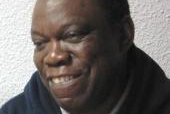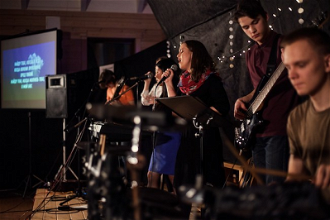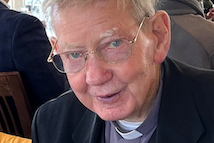Text: 'Rediscovering Catholicity in a globalised world'
Dr Robert Kaggwa, MAfr is Roman Catholic chaplain at Roehampton University. This is a summary of the keynote speech he gave at St Anne's Church, Soho, London on 15 October 2005.
I was invited to give a keynote speech to a group of Catholics commemorating 25 years of the National Pastoral Congress. I had not been at the Congress in Liverpool in 1980 and I wondered how I could contribute anything meaningful to the group. But I was well aware that all those gathered at St Anne in Soho wanted to tell their story and the story of Catholicism in England and Wales. I accepted the challenge knowing that I could listen to their story as I also would bring my story to them.
Everyone wanted to find space, an environment to their story in the background of the Liverpool story and in the background of God's story that has been retold over and over again in the Bible, in the Church, in other faiths and in society.
Together we wanted to make sure that no story was left untold as we build a Church of Jesus Christ that is inclusive, a Church that listens to all stories, a church that is true community. One of the striking features of the gospels is how Jesus never ceases to tell stories. Most of his teaching emerges through storytelling. In his stories or parables Jesus invites us to enter the world of meals, dinner parties, wedding feasts, gardening and cooking, broken families, judges, tax-collectors and daily encounters of rich, healthy, sick and poor people. It is often at the level of these very ordinary events narrated in simple stories that our salvation and happiness finds expression. Stories are often full of the unexpected and the unexplained, but they help us to express our emotions and what lies deep in our hearts. They provide us with a vehicle through which to express ourselves at moments of pain and turmoil.
For Jesus, storytelling was not about entertaining people with harmless niceties. His parables were often subversive and they were meant to confront and challenge and to invite to conversion.
Jesus was executed not because he entertained people with bedtime stories but because he told dangerous stories that radically challenged their exclusive understanding of God's reign. In other words Jesus wanted a world in which all people's stories could be taken seriously.
The theme of my talk was 'rediscovering Catholicity in a globalised world'. Catholicity should point to a world and a Church that are inclusive, a world and a church that listen to all experiences and to all stories. Today we live in a world of uncertainty and as Christians we need to listen with both ears to every experience, every story.
The story of globalisation and catholicity is a story of uncertainty. Both globalisation and Catholicity point to universality but again both can represent seriously opposed values and intentions. We are living in a fragmented age. Some have called this the time when the West is experiencing the same ambivalences or contradictions felt by the rest of the world. It is the time of the shaking of foundations. Old Certainties have gone. This was expressed so well by Mary McAleese, President of Ireland as she narrated memories of her childhood in Belfast to a group of missionaries: "There was little space in those days for modern day concerns about cultural diversity or religious imposition. Even if there had been, no doubt we would have stared blankly in amazement.
For the world I grew up in was one of very stark divisions and utter certainties. It was a world where on the same narrow street, Catholics and Protestants lived side by side, yet a world apart. For my family God was male, Irish and Catholic. For my Protestant friends, God was still male 'no gender bending allowed' but with equal certainty, they knew him to be Protestant and British.
Globalisation has become a buzzword in today's society. Yet it is such a complex and nebulous phenomenon. Scholars disagree about its meaning and when it began.
It is an uneven process that affects people in different ways.
Professor Roberts of Tulane University has imagined how the world would look like if it had only 100 people. "If we should shrink the Earth's population to a village of precisely 100 people, with all the existing human ratios remaining the same. It would look like this: There would be 57 Asians, 21 Europeans, 14 from the Americas (North and South) and 8 Africans. 51 would be female, 49 would be male. 70 would be non-white, 30 white, 70 would be non-Christian, 30 Christian. 50% of the entire word's health would be in the hands of only 6 people and all 6 would be citizens of the United States of America. 80 would live in substandard housing. 70 would be unable to read. 50 would suffer from malnutrition. One would be near death. One would be near birth. One would have college education. No one would own a computer."
There are certainly many positive effects that we can celebrate because of what is called globalisation. Modern means of communication, the telephone, mobile phones, the Internet, air travel and so many modern achievements have made our life easier. Yet no one can deny the fact that so many people do not profit from these positive effects of globalisation. There are instead many negative effects.
Globalisation does not only produce interconnectedness but also fragmentation. We live in a world of global capitalism where money is no longer a means to our well-being but an end. Trans-National Corporations rule the world as they maximise their profits regardless of the world's problems.
We have reached a global crisis so big in terms of poverty, environmental degradation and monopolization of wealth by a small elite.
Rediscovering Catholicity
As we celebrate 40 years of Gaudium et Spes and the closure of Vatican II we need to revisit the meaning of Catholicity.
The late German Jesuit theologian, Karl Rahner described Vatican II as the Church's first official self-actualisation as a World-Church. It was the first time that all the world's Catholics were represented at an ecumenical Council. At Vatican II we had Catholicity in the making. Rediscovering catholicity can help us engage with the globalisation process without simply being reactive to it.
We need to be attentive to such a complex phenomenon without succumbing to its enticement or resigning to its inevitability. We must also realise that we cannot simply give solutions or remedies but also recognise that we as Christians are also part of the problem. The word 'catholic' does not appear in the Bible. It is Ignatius of Antioch, who in the year 110 first uses the term when he writes that "Wherever the bishop appears, there let the people be; as wherever Jesus Christ is, there is the Catholic Church."
However, Catholicity is one of the marks of the Church as defined by the Nicene-Constantinople Creed, in which Christians profess faith in "in one, holy, catholic, and apostolic Church." Christians seem to return to these marks in times of conflict and uncertainty, when they feel that their identity is threatened. Historically most of the discussion about Catholicity has largely been of an intra-church nature. Competing groups have tried to claim to be the true manifestations of the Church of Jesus Christ.
Early Church controversies were mainly about this even though they often had a public nature. Catholicity has the dual meaning of universality and orthodoxy (fullness of faith). But it has also tended to acquire a juridical meaning in terms of controversy as in the time of the Reformation. Rome understood Catholicity as communion with the bishop of Rome. However, alongside this understanding there was also a mystical one adopted by the Eastern Churches and also later by the Churches of the Reformation. This understanding referred to Catholicity as something that would be achieved only in the fullness of time.
The church visible is incomplete and broken, but already participates in the invisible church. All in all one can identify many meanings of Catholicity throughout history: fullness and orthodoxy, extendedness and even identification with the Empire, juridical bond and conformity, partial and visible manifestation of the already and not yet fully revealed lordship of Christ.
Different contexts and circumstances led Christians to modify their understanding of Catholicity. For all Christians Catholicity may be seen as the ability to hold things together in tension with one another. It is about tentativeness anticipating the whole. While the traditional understanding of Catholicity expressed extension throughout the world and fullness of faith, today we need to see this fullness or wholeness through exchange and communication pointing to full (koinonia) as reconciliation, sharing, participation and communication.
This communication leading to wholeness or fullness needs to take contextualisation and inculturation seriously as it is important to renew the way the Gospel is received in different cultures and contexts. Most important a renewed catholicity must be present at the boundaries of those who profit and enjoy the fruits of globalisation and those who are excluded and oppressed by it. If a message is not received the quality of communication needs to be reassessed. How is the message communicated and how is it perceived? Here it is also important to stress the indeterminacy of the message. Indeterminacy is not necessarily negative. It may point to an important aspect of the message because at the heart of the Christian message lies a narrative, a story and not a proposition.
Christian faith thrives on a certain indeterminacy that allows the story to be retold. Earlier missionaries so quickly condemned cultural expressions as syncretism without a careful understanding of how people received and assimilated the message. They often did not take into account people's stories. Today we need to recognise that Christian ministry is not so much about bringing God to a godless world but to a world in which the divine presence is already active.
Collaboration with secular agencies will be important. Any solidarity that supports justice making can only be welcome and in line with the Gospel message. The speaker must then be ready to be surprised by the hearers and to receive the message from them. Church policies that frustrate agency run the risk of replicating the worst mistakes of globalisation and reinforcing its exclusionary and oppressive aspects.
The New Catholicity will point to community and to creativity, both of which are gifts of the Spirit who blows where s/he wills. All this requires the renewal of our understanding of community. In today's Church one can see two models operating side by side: the neo-conservative model and the model of small basic communities. Are these two groups listening to each other's stories? The first one seems to have been favoured very much by the hierarchy especially in the last papacy. The second may point to the Church of the future in which shared responsibility of all the baptised will be extremely important. This will require boldness and creativity because it is the work of the Spirit. It requires us to abandon old certainties.
As the late Anglican bishop, John V Taylor wrote: "To think deeply about the Holy Spirit is a bewildering, tearing exercise, for whatever [the Spirit] touches [the Spirit] turns it inside out."
Prophetic imagination is a gift of that we will always need. The Spirit who speaks through prophets, gives the freedom to dream and create connections. It maybe that in this world so full of cracks and uncertainities we need a different kind of listening: listening to the stories and experiences of the 'other', the marginalised, listening to the 'eccentric' (were the prophets not often considered eccentric?), listening to secular movements of liberation, listening to the stories and aspirations of so many young people who have been disillusioned by the institutional Church, listening to their apathy, listening to the resistance coming from the underside of history, listening to women and to the contribution of feminist spirituality. In the church and society people of different sexual orientation need to listen to each other's stories.
Society needs to listen to the stories of immigrants and asylum seekers who come with their indigenous spiritualities. Of course discernment will be necessary but let us not be cautious of this in such a way that we stifle the Spirit of God. here is a lot of creativity in all this and we need to listen to this creativity. But let us not be cautious of this in such a way that we stifle the Spirit of God.
The prophecy of Joel (2: 28-32), repeated in Peter's sermon at Pentecost refers to a multiplicity of experiences and testimonies of the Spirit (Acts 2: 17-18). It is an all-inclusive vision. Christians will need to embark on this process by exploring what the Gospel of God's inclusiveness and unconditional love has to say in our age of globalisation where so many people are excluded in many different ways - a world in which so many people's stories are not listened to. This will require a renewed sense of Catholicity that is creative and inspired by the Holy Spirit who never ceases to surprise and renew God's people.
Our commitment will be lived in such a way that there is the recognition of God's Spirit preceding us in the world. The Church will learn to be attentive to the many voices and to the many stories being told today and to form alliances with secular agencies. Christians will acknowledge their participation in the multiple identities of their existence. Thus the language of catholicity will become the point of intersection between the Church and the world, politics and religion.




















